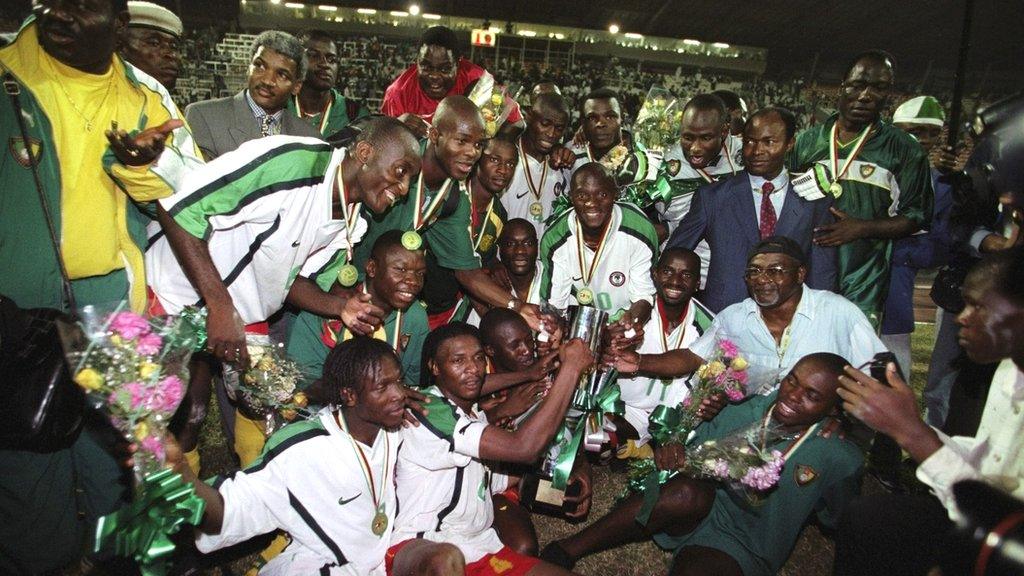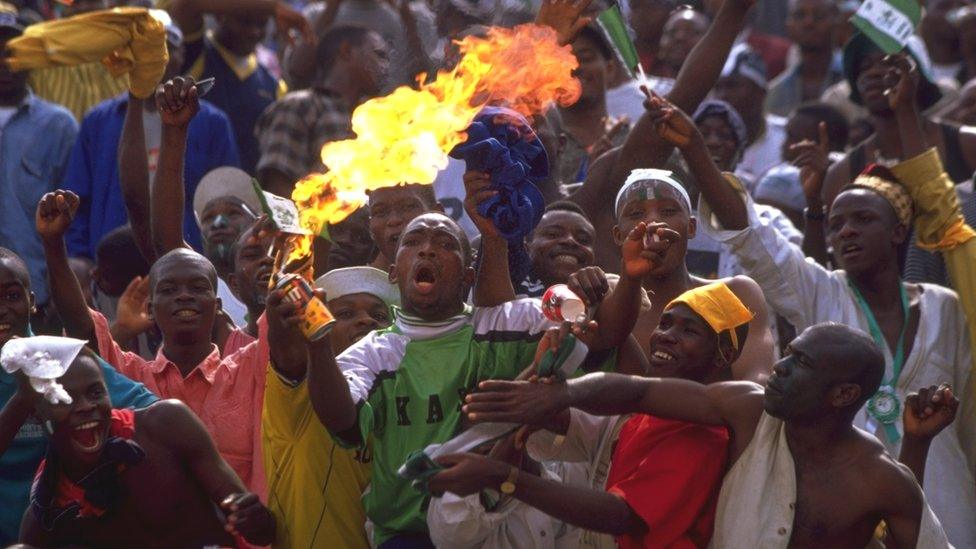Nigeria and Benin bid to co-host 2025 Africa Cup of Nations
- Published

Cameroon won the Africa Cup of Nations final in Lagos when Nigeria last staged the tournament in 2000
Nigeria and Benin have submitted a joint bid to stage the Africa Cup of Nations in 2025, so joining Algeria, Morocco and Zambia in having expressed an interest in hosting the finals.
Three-time African champions Nigeria are looking to stage for the third time, having co-hosted with Ghana in 2000 after being the sole organisers in 1980.
"Having completed all the processes, we submitted our bid before the Confederation of African Football (Caf) deadline of 16 December," a top Nigeria Football Federation (NFF) official told BBC Sport Africa.
"The NFF will be sharing more information on the bid to stage the tournament in the coming weeks."
Winners on home soil 42 years ago, Nigeria lost the 2000 Nations Cup final to Cameroon in a tournament generally considered to be a success.
Hosts of the Under-20 World Cup in 1999, Nigeria last staged a major tournament in 2009 when the Under-17 World Cup took place in the West African nation.
Nonetheless, both Nigeria and Benin would appear to have work to do to convince the Caf inspection teams, set to tour bidding countries from 5 to 25 January next year, of their seriousness to replace Guinea.
Designated host Guinea was stripped of rights earlier this year because of concerns over infrastructure and facilities - issues which Nigeria shares.
For aside from Uyo, the venue for last season's Caf Confederation Cup final, and the refurbished Moshood Abiola National Stadium in Abuja, Nigeria has often struggled to find a decent stadium to host the Super Eagles.
The Lagos National Stadium, which staged the final of the 2000 final, is being renovated, while dozens of others in Nigerian cities have become white elephants - furthering emphasising the country's poor maintenance culture.
Criteria required by African ruling body Caf to stage the event include a minimum of six stadiums, two of which must have a capacity of at least 40,000 while the other four need to be able to accommodate at least 20,000.
As the 2023 general elections loom in Nigeria, Africa's most populous nation is struggling with high inflation, unemployment, power outages as well as an unprecedented wave of different, but overlapping, security crises.
From kidnapping to extremist insurgencies, almost every corner of the country has been hit by violence and crime.
There was also unrest inside the stadium in Abuja after Nigeria lost their 2022 World Cup qualifying play-off against fierce rivals Ghana, with the pitch invaded, dugouts overturned and visiting fans, players and officials pelted with missiles.
Critics of the Nigerian bid believe the country should have made a sole approach in its quest to host the continent's showpiece event.
Benin has never staged a major continental finals and its notable stadiums are Stade de l'Amitié, which can accommodate 20,000, while the Stade Charles de Gaulle in the capital Porto-Novo can only currently hold 13,000.
Zambia bid to boost 'diplomatic' agenda

Nigerian supporters during the 2000 Africa Cup of Nations final against Cameroon
Ahead of the Caf bidding deadline, Zambia has also announced it will try to stage the tournament for the first time in 2025.
"We believe our bid stands a very good chance given that southern Africa has not hosted any Nations Cup since the 2013 edition staged by South Africa," the Zambian FA (Faz) said in a statement.
"On our part, we already have two Caf-certified venues in the National Heroes and Levy Mwanawasa (venues) while four other existing stadia will be upgraded to at least 15,000- and 20,000-capacity."
Faz also stated that the Zambian government - which it says is keen to host "as part of its wider international diplomacy agenda" - has agreed to build a new 20,000-capacity stadium in Livingstone for the 2025 tournament as well.
The successful candidate to host the 24-team finals is set to be announced in February.